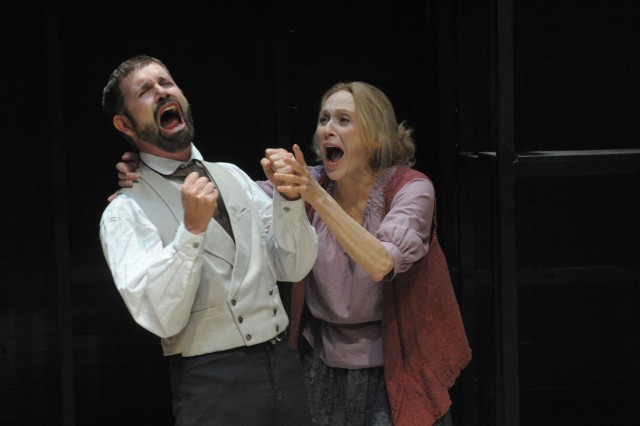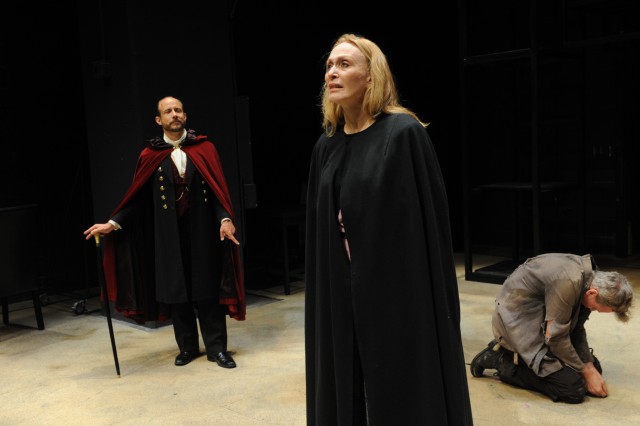
Carpeta (David Barlow) and Galactia (Jan Maxwell) battle over love and art in Howard Barker revival (photo by Stan Barouh)
Potomac Theatre Project
Atlantic Stage 2
330 West 16th St. between Eighth & Ninth Aves.
Through August 9, $35
ptpnyc.org
If Jan Maxwell is indeed retiring from the stage, as she recently told Timeout, she has chosen quite an exit. The five-time Tony nominee is revisiting her widely acclaimed role as Venetian painter Galactia in the Potomac Theatre Project’s revival of Howard Barker’s Scenes from an Execution, which the company first performed at the same venue, Atlantic Stage 2, in 2008, earning Maxwell a Drama Desk nomination. Maxwell gives a swirling, emotional whirlwind of a performance as Galactia, a stubborn, nasty, extremely candid, deeply sensual, and, in her own way, highly virtuous painter (inspired by Artemisia Gentileschi) who has been commissioned by the doge of Venice, Urgentino (Alex Draper), and Cardinal Ostensible (Steven Dykes) to paint a major mural glorifying the city’s victory in the Battle of Lepanto. She uses people to achieve her lofty artistic goals, whether it’s a war veteran with a crossbow bolt stuck in his head (Dykes again) or her lover, married religious painter Carpeta (David Barlow). She does not want to be treated differently because of her gender; “Try not to think of me as a woman,” she says early on. “Think of me as a painter.” Although the doge sees this as a chance for Galactia to gain wealth and fame — “You have not been asked to paint the back wall of the vicarage,” he tells her. “I am saying that a canvas which is one hundred feet long is not a painting, it is a public event” — but she is determined to show the true cost of war, the violence, the brutality, the death. However, Carpeta argues that there is something that will always be lacking in her work. “I don’t think you have pity, so you can’t paint it,” he says to her. “Ah. Now you’re being spiteful,” she responds to her lover, who replies, “No. You are violent, so you can paint violence. You are furious, so you can paint fury. And contempt, you can paint that. Oh, yes, you can paint contempt. But you aren’t great enough for pity.” Galactia rejects that idea, saying, “Pity’s got nothing to do with greatness. It’s surrender, the surrender of passion, or the passion of surrender. It is capitulating to what is.” As she continues the mural, refusing to listen to the doge, who wants his brother, Admiral Suffici (Bill Army), to be portrayed more heroically, she is threatened with severe retribution, which she welcomes with open arms.
Originally written as a radio play for the BBC in 1984 starring Glenda Jackson as Galactia (Jackson and Fiona Shaw have also played the role onstage), Scenes from an Execution is a powerful story of identity and control told as a fight between an artist and the ruling elite over history and legacy. Maxwell immerses herself so much into the role that it feels like magic; when Galactia defends her right as a woman to do anything and say anything that a man can, and to create art without being judged because of her gender, it’s as if Maxwell is making one last stand for her own career, which will turn to film and television once the show closes on August 9. She huffs around Hallie Zieselman’s spare set, which features scaffolding in the back, ranting about her age, her body, and her looks, but Maxwell infuses Galactia with a youthful beauty and energy that is as intoxicating as it is mesmerizing, no matter how self-deprecating it becomes. Barker, whose Judith is running in repertory with Scenes, manages to avoid clichés and never devolves into self-congratulatory pedantic speechifying, even getting away with such character names as Urgentino, Suffici, Sordo, Lasagna, and Ostensible as well as Supporta and Dementia, Galactia’s daughters (played by Lana Meyer and Melissa MacDonald, respectively). Director Richard Romagnoli occasionally freeze-frames the action, as if the audience is suddenly looking at a painting; however, whenever Galactia or Carpeta are hard at work, sketching or painting, they are only mimicking, pretending to move their brushes over a nonexistent canvas or draw on a sheet of paper that remains blank. “Look, her sketchbook on the floor, hot with smudges and corrections,” Urgentino says to art critic Gina Rivera (Pamela J. Gray), pointing at an empty page. “Look! Touch it!” But there’s nothing to touch. Painting, like theater, is to be experienced with different senses, requiring something else from the viewer. “I believe in observation, but to observation you must lend imagination,” Galactia says. Imagination plays a central role in Scenes from an Execution, which also deserves nods for Mark Evancho’s lighting and Cormac Bluestone’s lighting. It’s quite a grand farewell for Maxwell; without trying to be clichéd or pedantic, it will be difficult to imagine New York theater without her.
